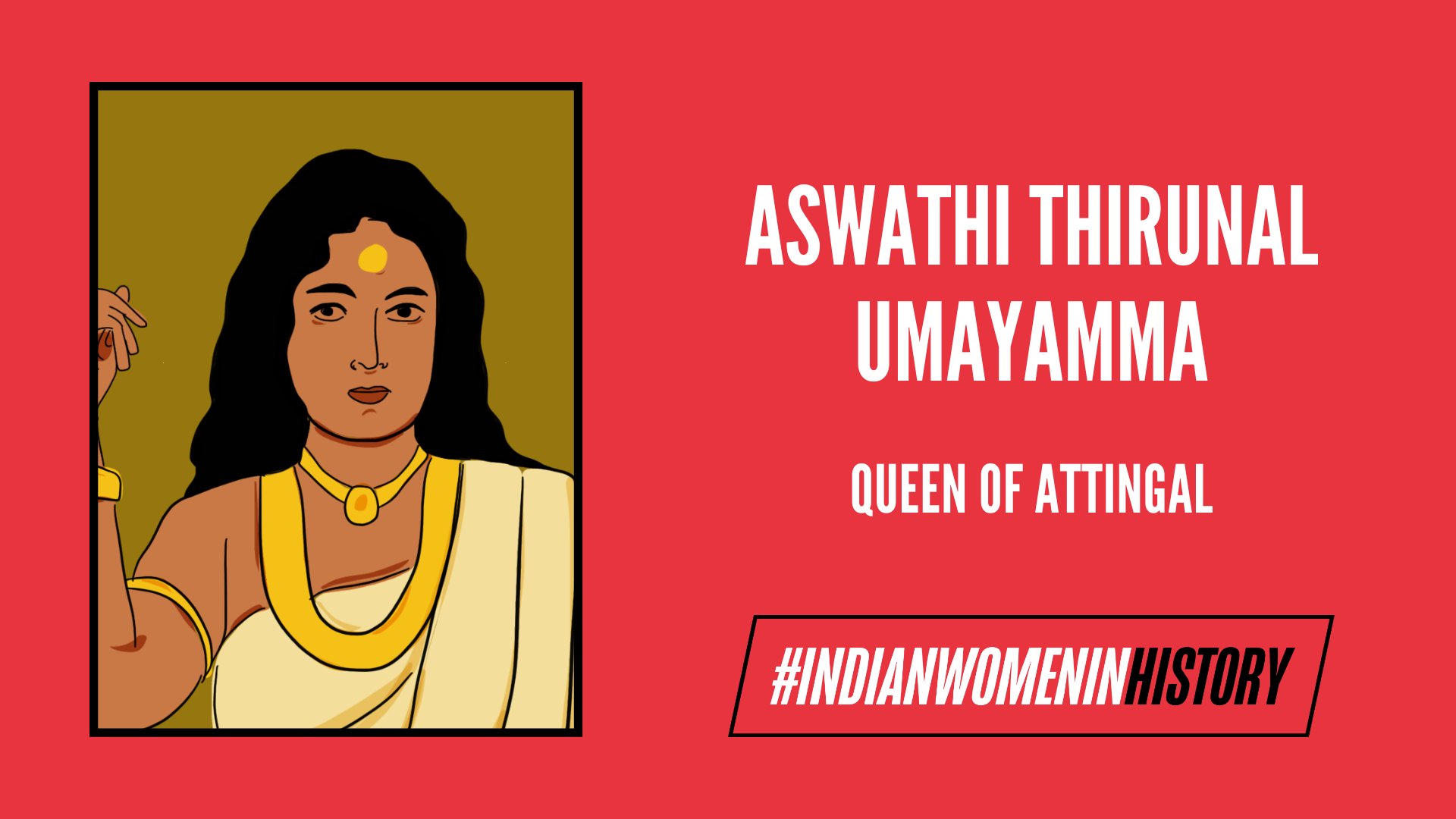In 2019, 79 women were been elected to the Lok Sabha in India, which means that even today, only 14 per cent of the elected representatives of the country to the Lok Sabha, are women. Women have always been deemed ‘unfit’ for engaging in politics and governance and the society has conditioned these fields as male. Among other similar statistics that contextualise the inadequate representation of women in the field of governance, the story of Ashwathi Thirunnal Umayamma Rani, the Queen of Attingal, Kerala is pertinent to explore.
Her life and the incidents that unfurled after her death are testimony to the fact that women have handled matters of administration and governance with prowess whenever given the opportunity, since times immemorial.

Attingal Rani: A fierce icon of leadership and courage
The matrilineal system of inheritance was very common in South India, especially Kerala until the twentieth century. It not only gave immense power to women but also conferred on them the responsibility to oversee their families and assets. Attingal, a small kingdom in Travancore had a lineage of powerful queens who had a significant role to play in matters of administration.
It was the king’s sister’s children who became the successors. In Attingal, only women had the right to rule and it was more important to have a female heir than a male one. In the absence of a legitimate heir in Attingal, the royal family would adopt girls from other royal houses.
The reign of Rani Aswathi Thirunnal Umayamma can be traced back to the death of the Travancore king Aditya Varma in 1677.There emerged an absence of a legitimate female heir since the successor was a minor prince named Ravi Varma. The junior Attingal Rani Umayamma, who was also the aunt of prince Ravi Varma stepped up to become the head of Venad region which included Nedumangad, Attingal, Kayamkulam and Kollam from 1677-1684.

She was an epitome of grandeur, strength and determination. Umayamma’s brilliant rule was fueled by the fierce legacy of the Attingal Ranis. She had an independent army which she led on her own. According to the documentation of Dutch Commander Hedrick van Rheede in 1677, “The princess of Attingal who is not alone the mother of [the prince of] Travancore but the eldest of [the entire royal family] has a territory of her own, independent of Travancore”.
While the English held their business interest in the area, she ensured that throughout her reign she dictated her terms to the English, keeping their vested interests at bay. Henrick Van Rheede, a Dutch commander has extensively mapped her life where he has mentioned that “(she had a) noble and manly conduct and was an Amazon feared and respected by everyone”
There was an age-old rule which barred Ranis of Attingal from crossing the Karamana river which led to the southern territories of Travancore. The intention was to prevent the expansion of Attingal Ranis into Travancore which was supposed to be a men’s den. However, Umayamma Rani ignored the restriction and ventured with her army into the heart of Travancore where the King fled before she reached with her troops, as per the records.

This event happened when she was a junior queen and as she grew, her vigour only got stronger. Her reign as the regent queen was held with high regard especially due to the ways in which she struck a balance of trade with the English and the Dutch. In the year 1684, she played a very important role in establishing the English post in Travancore.
Also read: Princess Catherine Duleep Singh: Suffragette And The “Indian Schindler” | #IndianWomenInHistory
While the English held their business interest in the area, she ensured that throughout her reign she dictated her terms to the English, keeping their vested interests at bay. Henrick Van Rheede, a Dutch commander has extensively mapped her life where he has mentioned that “(she had a) noble and manly conduct and was an Amazon feared and respected by everyone”.
She had to face various social and cultural problems that were caused due to unrest in the increase in foreign trade and a general patriarchal disdain that a female ruler was destined to endure. During her reign, despite occasional failures in her expeditions, she refused to give up her political positions into the hand of other male nobles whose influence in the region was getting stronger with time.
Assertion of personhood and autonomy
At a time when sex and autonomy in sexual relationships were the restricted to men, things were different in some parts of Kerala. Umayamma is known for her unabashed assertion of personhood and sexual choice. Records suggest that Umayamma was a very liberal person who took lovers as she pleased.
The grant of Anjuthengu was supposedly her gift to an Englishman who satisfied her. She chose her partners at her own will. John Henry Grose cites that ‘whom and as many as she pleases to the honour of her bed’ could be taken by the Rani as lovers in the matrilineal system. He adds that, ‘The handsomest young men about the country generally compose her seraglio.’ the Rani could send away her partner(s) whenever she grew tired of them, and she did not shy away from exercising this right of choice.

However, while documenting her life, most accounts tend to chastise her and ignore the personal choices she made in her assertion of bodily choice and sexual agency. Ulloor S Parameswara Iyer’ Umakeralam is one such narrative which is based on several incidents that happened in the life of Umayamma Rani.
The legacy of Attingal Rani officially came to a stand still when Raja Marathanda Varma in his attempt to establish monopoly over the whole of Travancore made the then Attingal Rani to sign the Silver Plate Treaty through which she relinquished all her sovereign rights in 1731
In the narrative, she is portrayed as a woman who is incompetent to be a ruler. Her identity as an efficient, bold and intelligent ruler is often appropriated and reduced to that of a woman who does not have any political power but only a social standing owing to her bloodline.
Such appropriation and patriarchal efforts have buried the legacy of Umayamma Rani deep beneath the sheen of the male Travancore princes. Apart from the literary appropriation, the cultural cleansing brought in by Victorian puritanism has also resulted in the hitherto unchecked freedom of women in the region coming under the ambit of moral restrictions and strict monitoring.
The decline of the Rani’s power
A significant void took shape after the death of Umayamma Rani in 1698. There were no female heirs in the family. Even though a queen was reinstated soon, she was heavily dependent on the nobles who were men from the upper caste where their power eclipsed that of the queen.
Soon, the privileges of the East India Company were expanded and the British arbitrarily went ahead without heeding to the rules of the queen and the royalty. They even secured permission to mint currency from the Rajahs of Travancore which altered the strategic position of the East India Company in the kingdom.
The legacy of Attingal Rani officially came to a stand still when Raja Marathanda Varma in his attempt to establish monopoly over the whole of Travancore made the then Attingal Rani to sign the Silver Plate Treaty through which she relinquished all her sovereign rights in 1731.

From having complete autonomy to being an equal signatory, to being a mere social presence, the Attingal Ranis and their legacy was watered down after the Silver Plate Treaty. The treaty further amended itself which led the queens to retreat to the inner corners of the palace as male domination of administration took a central stage.
The legend of Umayamma Rani is largely unknown in the region, let alone the subcontinent. True to her words and self, Umayamma Rani was an example of a woman who lived life on her terms while leading a kingdom without letting anyone stand in her way. Her contribution in checking foreign invasion and upholding sovereignty cannot be ignored. Her life proves that one’s competence is rooted in their experiences and not on the categorical definitions of gender and femininity.
Also read: A Memoir Of The Sultan Jahan Begum: Indian Feminist Icon | #IndianWomenInHistory
About the author(s)
Anagha is a postgraduate student who is interested in the field of gender studies and sociology. She hopes to make the world a better place for all genders, one step at a time. Being a person who tries to make things better around her, she is in a constant process of learning and unlearning. Reading and gardening are her escape from the daily hustle




